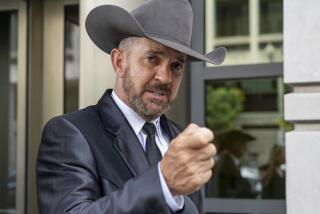U.S. Envoy Rejects Judicial Panel’s Order to Sanction Bosnian Serbs
- Share via
SARAJEVO, Bosnia-Herzegovina — Overruling a panel of judges, the American diplomat in charge of elections in Bosnia has declined to punish Bosnian Serb hard-liners for maintaining war crimes suspect Radovan Karadzic as a key figure in their political party.
Ambassador Robert Frowick said Tuesday that he made his decision primarily out of concern for the safety of American and other foreign election supervisors stationed in the Bosnian Serb half of the country. Nineteen supervisors, including 17 Americans, were withdrawn Tuesday at an “accelerated” pace from the hard-line town of Pale, Karadzic’s headquarters, Frowick said.
Frowick heads the Bosnia mission of the Organization for Security and Cooperation in Europe, which conducted nationwide municipal elections this past weekend. He rejected a judgment by the OSCE’s judicial arm ordering that the Bosnian Serbs’ Serbian Democratic Party, or SDS, be disqualified and retroactively removed from the election in their Pale stronghold.
The decision not to sanction the SDS stunned groups that have advocated a tougher stance on Karadzic, but it was apparently made with U.S. blessing if not urging.
It came as critics warned that concessions made to all three of Bosnia-Herzegovina’s nationalist parties threaten to undermine the electoral process, and it showed that the influence of Karadzic remains strong two months after U.S. envoys secured a renewed promise that the indicted former president would leave the political scene.
Justice Finn Lynghjem of Norway, the lead judge of the OSCE’s judicial panel, the Election Appeals Sub-Commission, said in an interview that he might quit in protest.
*
Under election rules agreed to by the Serbs, Muslims and Croats as part of the Bosnian peace process, a person indicted by the international war crimes tribunal at The Hague may not have a role in a political party. In an agreement brokered by American trouble-shooter Richard Holbrooke in July 1996 and reaffirmed this July, Karadzic agreed to stay out of politics. In truth, however, his influence has continued.
Some international election officials have long sought to build a case against the SDS, but the conclusive evidence, they say, came during the weekend elections, when new red, white and blue posters glorifying Karadzic and bearing the SDS logo were plastered all over Pale and other cities in Republika Srpska, the Bosnian Serb republic.
“The [appeals sub-commission] takes the view that the SDS must be sanctioned severely if the integrity of the election is to be maintained,” Lynghjem wrote in the judicial panel’s decision issued Monday. Allowing a person twice indicted on genocide charges to maintain a role in a leading party “shocks the conscience,” he wrote. “This evidence can no longer be ignored or tolerated.”
Frowick, who consulted late Monday with U.S. officials--including the Clinton administration’s special envoy to Bosnia, Robert Gelbard--said he respected Lynghjem’s decision but could not let it stand. He said Gelbard promised to back Frowick’s decision, offering to build consensus among major countries.
He said that decertifying the SDS could endanger more than 850 foreign election supervisors in the Bosnian Serb republic, the site lately of ugly scenes of mobs throwing stones at U.S. troops.
Of particular concern, he indicated, were 17 American supervisors holed up in a hotel in Pale on Monday night when news of the judges’ decision was broadcast on Bosnian Serb radio. Frowick said he received a telephone call from U.S. Embassy officials alerting him to the plight of the Americans.
Also, he said, an angry SDS could block attempts by international officials to install newly elected city officials in Serb-held areas where Muslims and Croats won posts. The SDS would also probably refuse to cooperate in future parliamentary elections, he said, which U.S. officials hope will boost the anti-Karadzic forces of Bosnian Serb President Biljana Plavsic.
Frowick conceded that compromise sometimes outweighs purity of principle. “It’s a balancing act--integrity and momentum. You can’t have all of either,” he said. “If we are going to move the process forward, we do it with as much integrity as we can achieve.”
A clearly disappointed Lynghjem, speaking in his office, said he objected to the seven-member panel’s decisions being used as “bargaining cards.”
“I want to stress the integrity of the elections and especially of the commission,” he said. “We are trying to teach a former Communist country how to abide by the rule of law, and my understanding of the concept is that no person is above the rule of law.”
The commission is a semi-independent body formed by the OSCE to enforce election rules and punish violators.
*
Advocacy groups were outraged at Frowick’s annulment of Lynghjem’s order. The International Crisis Group, a Washington-based organization that monitors peace in Bosnia, said overturning the appeals commission’s decision was one of several “eleventh-hour deals” concocted in “smoke-filled rooms” that sacrifice scruples in the interest of keeping elections on track.
“Giving in to the pressure of potential mob violence spells disaster” for the peace accords that ended Bosnia’s war 21 months ago, said Hrair Balian, director in Bosnia of the crisis group. “There are always risks. Do you allow yourself to be taken hostage by the risks? The integrity of the elections is at stake. The integrity of the OSCE is at stake.”
On the eve of the elections, Frowick also reinstated two Bosnian Serb candidates whom the appeals commission had removed because of fraud, in a concession to prevent a Bosnian Serb boycott of the polls. The two were among about 50 candidates struck from party lists as punishment for abuses.
More to Read
Sign up for Essential California
The most important California stories and recommendations in your inbox every morning.
You may occasionally receive promotional content from the Los Angeles Times.














